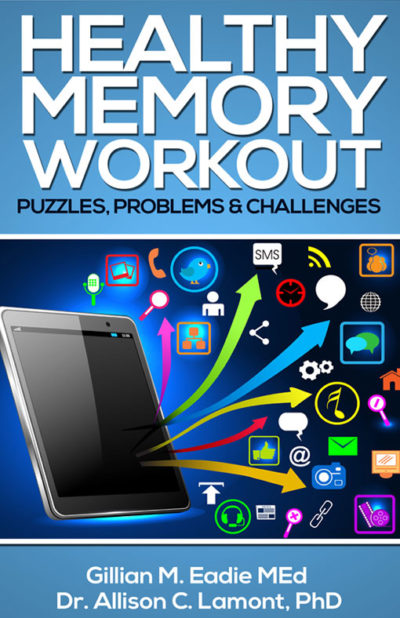What a nightmare it is when time is against you and you can’t find your keys, wallet or even your car! 
Why does this happen?
And what can you do about it?
Did you know that the human brain can focus on only one thing at a time?
Maybe it is just for a nanosecond – but the focus is on ONE thing only.
That’s why multi-tasking is a myth.
Multi-tasking is a rapid shifting of focus from one thing to another of those things you are trying to do at once.
Quality attention to them all is impossible.
And it wastes (and exhausts) your cognitive reserves.
Your brain quickly ‘forgets’ anything that you have not committed to long-term memory so, if you put down your keys or wallet – or even park your car – on autopilot, without thinking,
then your memory will let you down.
To remember where things are, you need to
- focus on the item
- concentrate on where it being placed
- and create a ‘memory trace’.
There are ways to help your memory, though. Try these.
Tips for remembering where things are:
1. Losing your car can be a major hassle.
• Look for the closest parking spot, even if it takes a few extra turns.
• Keep track of the number and level of your parking spot. Jot this down.
• Look out for landmarks like stores, large signs or trees.
• Use your mobile to photograph your parking spot, with an identifier in the frame.
• Pressing your remote locking device will give you a welcoming flash of your lights, if all else fails!
2. Your wallet is basically your entire life wrapped in one place.
• Designate a dish as your official wallet holder, and use it for things you use daily (watch, keys).
• Keep this dish (or simply your wallet) on a table you’ll see it on your way out.
• Or, put your wallet in your jacket or handbag; then you’ll know it’s with you when you leave. Make sure to check for it when you change jackets or handbag.
3. To keep track of your keys:
• Leave them on a hook next to the door.
• Attach a paging or remote locator device to your keychain.
• Most men have a cup or bowl for spare change; use this to store your keys. (See previous tip.)
• Giving a trusted friend or family member a spare might save your sanity in an emergency.
4, To avoid losing your mobile phone:
• Designate one convenient place for it in your home, and always keep it there. By your charger is good.
• Avoid silent and vibrate modes if possible — calling your own number can help find the phone.
• Take a pic of a page that reads: This phone is owned by (your name) Please phone (number) or email (address). Lock the image into your memory card so that it is never erased. It will work for honest people!
5. Losing phone numbers & e-mail addresses is like losing your world:
• Store contact information directly into your phone.
• Have an iphone or similar to store numbers and addresses the moment you receive them. Back up this data on your PC, regularly.
• Keep a physical address book in addition to your mobile devices or create one on your computer. Ask for business cards and keep them in a card-holder.
6. Take steps to make sure you don’t lose your PC files:
• Keep a well-labelled database (Excel spreadsheet is good) and make sure to always back up important files.
• Create shortcuts on your desktop to your most important files to avoid spending loads of time looking for them.
• Take care with the files you choose to download from the internet. Some dubious sites are sprinkled with spyware, which can disrupt your computer’s functioning. These can cause you to reinstall your operating system, and lose your files in the process.
• Invest in an anti-surge filter to safeguard your PC against power outages.
7. Losing work documents will not enhance your reputation or image.
• Back up all of your work. Ensure your network backups are happening each day and/or use PDF’s, zipped files, Dropbox, Evernote or even photocopies.
• An alphabetical or date-based database is useful, either electronic or hard copy.
8. Keeping track of receipts will save time for reimbursements, tax claims or refunds.
• Develop and maintain a filing system, from the smallest purchases (coffee shop receipts) to the most extravagant (trips, cars, etc.). Doing this gets you in the habit of filing away all those loose bits of paper.
• Make copies of your most expensive purchases, like TVs, computers, electronics or appliances. Sometime they’ll need servicing.
• Keep your receipts in a specific desk drawer, labelled, or with the rest of your other accounts.
9. Make sure you don’t lose your family pet!
• Make sure Fido or Samantha has a collar and a tag. Micro-chipping is also an excellent idea.
• Keep a close eye on your pets, especially around open doors and windows.
10. Items on your shopping list
• Use your mobile to photograph your recipe or shopping list – have it with you in the store.
• Practice one of the memory techniques from 7-Day Brain Boost Plan. With just a few minutes concentration and practice you’ll give yourself a lifelong technique that will ensure you never forget an item in the store again.
For further information on your memory and how it works, go to How to Remember 101




